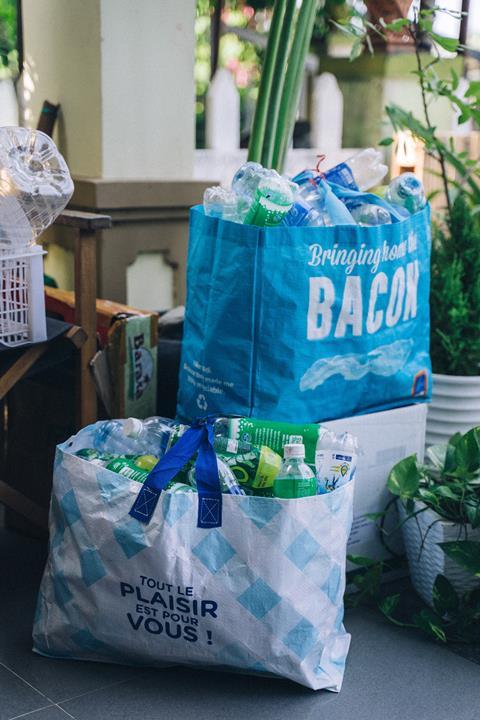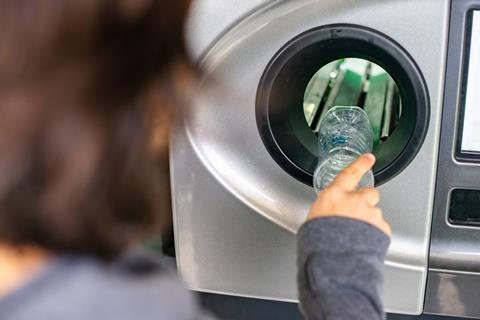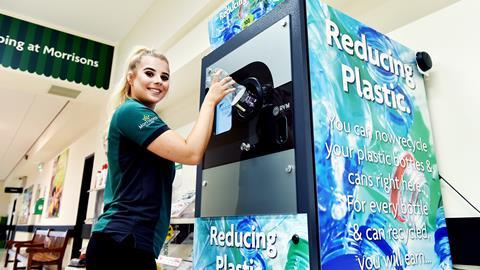Glass is out, 2025 is the deadline and industry will run the scheme
The government has finally fleshed out proposals for a deposit return scheme in England, Northern Ireland and Wales, in its response to a consultation.
So, is it a great leap forward for the environment or a blueprint for chaos?
2025: too late or too soon?
Under Defra’s proposals, the scheme will not start until October 2025, seven years after then-environment secretary Michael Gove first committed to launching a DRS, back in 2018. “Five years of dithering and pollution,” is Greenpeace’s verdict.
Yet the BRC claims the timescale is “unsustainable”, arguing longer is needed. It points to Scotland, where a DRS is due to launch in August this year, and which has seen retailers and suppliers in uproar over the costs. It has led to the scheme being drastically scaled back, with a legal challenge backed by The Scottish Grocer’s Federation to overcome.
So the BRC claims DRS should be shelved and drinks containers instead incorporated into the government’s planned Extended Producer Responsibility (EPR) Scheme.
“Retailers’ experience of establishing a Scottish DRS shows implementation is immensely more expensive and complex than anticipated,” says BRC head of food Andrew Opie, arguing costs for retailers will add to inflationary pressure on households.
“The significant investment required would create immediate and large costs for retailers, increasing inflationary pressures at a time when many households are already struggling.”
But BRC’s stance has angered drinks suppliers who say it’s time for the industry to get behind DRS.
“I think the BRC have completely lost the plot,” says one We’ve been talking about this since 2018 and there is massive consensus support from the public,” says one. “Supermarkets can’t just bury their heads in the sand now.”
On the other hand, Defra itself casts doubt over the feasibility of an October 2025 start date, in its consultation response, saying it is a “stretching target date” which will only be met if talks with industry are a success.

Who will run it?
Ministers want an “industry-led” solution, mirroring Circularity Scotland (CSL), the body in charge of implementing and running DRS north of the border, formed of the major supermarkets, drinks suppliers and industry bodies.
The Grocer understands many of the same companies would be front runners to manage DRS in the rest of the UK. While that may at help ensure there is ‘joined up thinking’ between the schemes, critics argue it risks serving the “vested interests” of big retailers and suppliers running the show.
The government has decided to ditch the traditional competitive tender approach in favour of a fast-tracked and cheaper application process for bodies wanting to act as a ‘Deposit Management Organisation’ (DMO), responsible for getting the scheme up and running in its first five years at least.
Wales will have its own DMO, separate to England and Northern Ireland’s.
The DMO will also face the challenges of exploring how online retailers can provide a takeback service, sorting out the VAT arrangements for deposits on in-scope containers, and coming up with the producer and handlings fees, all of which have proved testing for CSL and forced it to scale back the scheme radically.
Defra says it is aiming for the necessary secondary legislation to be in place by the end of this year, with the DMO appointed by next summer.
“That’s a crazily short timeframe,” says one industry source.
Glass excluded
A major talking point is the exclusion of glass collection. “In what kind of world is collecting glass drinks containers not an essential part of a system designed to collect drinks containers?” says Greenpeace UK.
“It reeks of corporate lobbying from companies who talk big on social responsibility, but do everything they can to push the problems they create onto others.”
And it’s not just campaigners up in arms. The Metal Packaging Manufacturers Association (MPMA) and The Aluminium Packaging Recycling Organisation (Alupro) accuse Defra of “knowingly giving glass materials an unfair competitive advantage at the point of sale whilst those buying cans will have no option but to pay a 20p deposit.”
“Consumers will be able to choose between a drinks container that carries a deposit and will have to be returned for that deposit to be redeemed, and a container that can just be placed in any recycle bin after use,” it says. “One option is extremely convenient, the other far less so.”
The fact the scheme in Wales, like that in Scotland, will include glass, adds more complexity.
“If you are a medium-sized producer going into the mults using glass as your primary pack, you’re going to have to deal with EPR in England and NI and DRS in Scotland and Wales,” says one supplier.
“That’s a whole world of pain and I can see people simply stopping supplying to Scotland and Wales.”
Yet the exclusion of glass in England and NI was welcomed by many industry groups, with British Glass calling it “the right decision for the economy, the environment, and for UK citizens”.

The role of digital
With reverse vending machines (RVMs) costing up to £100,000 each, it’s easy to see the appeal of a digital solution, using doorstep collections and smartphone technology instead.
Unlike in Scotland, where ministers have so far poured cold water on the idea, Defra’s consultation response points to a future role for digital DRS (DDRS), which it says has strong support from consumers. But this is tempered by “lack of knowledge and evidence” that DDRS can work effectively, it says.
The document also raises fears of increased levels of fraud and reduced control over the quality of returned recyclate into the scheme.
The Welsh government, which has comparatively advanced household collections, has been the strongest supporter of DDRS.
Alice Rackley, CEO of Polytag, a company producing technology to track packaging through its life cycle, says a trial with Ocado “proved unequivocally” that households would be able to redeem deposits from home.
Rackley says DDRS supporters are “frustrated” over claims of a lack of evidence, and says a digital system would reduce rather than increase the risk of fraud.
“The Government’s decision to opt for a traditional RVM system is utterly out of touch with the needs of the public,” claims another leading DDRS exponent re-universe Chairman, Tony McGurk.
“The real DRS opportunity lies with a Digital DRS.”
A delayed whole-town trial of DDRS, backed by several major retailers, is due to launch at Easter.
Joined-up thinking
The lack of a joined-up approach between UK nations has led to warnings from businesses including Tesco-owned wholesale giant Booker of administrative mayhem and enormous costs for companies.
Coca Cola has also warned of implications from lack of a joined up UK approach.
The consultation response says the various governments are committed to “working through potential solutions to minimise costs and business risks” and will “continue to work across all four nations on how the schemes interact”.
But detail is lacking. GS1 UK CEO Anne Godfrey fears “unnecessary cost and complexity for businesses and consumers alike”.
“Both consumers and businesses will be faced with a DRS postcode lottery, one in which where you live, or trade, will determine the extent to which you are able to participate.” And how much it will both work and cost, of course.




















No comments yet